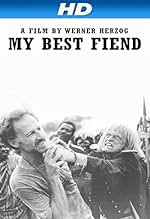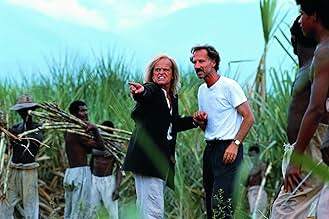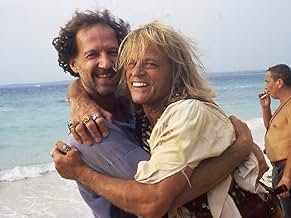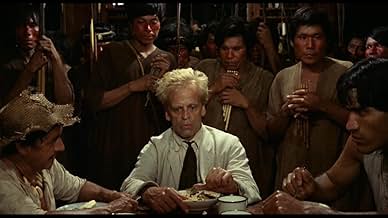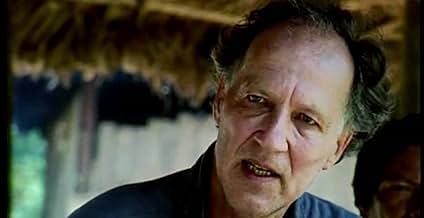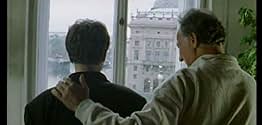Mi enemigo preferido: Klaus Kinski
Título original: Mein liebster Feind - Klaus Kinski
CALIFICACIÓN DE IMDb
7.8/10
13 k
TU CALIFICACIÓN
Documental sobre la relación profesional y personal entre Werner Herzog y Klaus Kinski.Documental sobre la relación profesional y personal entre Werner Herzog y Klaus Kinski.Documental sobre la relación profesional y personal entre Werner Herzog y Klaus Kinski.
- Premios
- 1 premio ganado y 2 nominaciones en total
Klaus Kinski
- Self
- (material de archivo)
Guillermo Ríos
- Self
- (material de archivo)
Andrés Vicente
- Self
- (material de archivo)
Paul Hittscher
- Self
- (material de archivo)
Mick Jagger
- Self - Wilbur
- (material de archivo)
Thomas Mauch
- Self
- (material de archivo)
Jason Robards
- Fitzcarraldo
- (material de archivo)
Walter Saxer
- Self
- (material de archivo)
- Dirección
- Guionista
- Todo el elenco y el equipo
- Producción, taquilla y más en IMDbPro
Opiniones destacadas
I like this documentary and recommend owning it. There are so many scenes that one can jump to to find Kinski's leering face and saying something fantastic. I believe that he somehow opened up his third eye and could no longer see most of the world that we live in. ----Or am I being fooled--- either way, Kinski has left his mark or should I say scar across the face of theatre and film. My only wish is that someone somewhere compiles a volume set of his greatest scenes ranging from a star performance in a well considered artful Herzog film to all of his 'B' movie bombs.
I still enjoy hearing Herzog imitating Kinski and saying, "I was Monumental I was Epical!!!!" ---and his description in the beginning of the doc. when he throws a tantrum that lasts for several days, destroying everything in the bathroom to the point where you could pass every bit through a tennis racket.
That is power. Watch it and believe.
I still enjoy hearing Herzog imitating Kinski and saying, "I was Monumental I was Epical!!!!" ---and his description in the beginning of the doc. when he throws a tantrum that lasts for several days, destroying everything in the bathroom to the point where you could pass every bit through a tennis racket.
That is power. Watch it and believe.
As a kid I saw "Aguirre La Colere de Dieu" on TV and was terrified by Kinski. But after all, what counts is only the film, and on movies you never see the director. Now if you watch "Mein liebster Feind - Klaus Kinski" at last you can see the other side - Werner Herzog. Or have glimpse of it.
Because of course, everything is from Herzog's point of view, so in a way this documentary does not differ from the real movies themselves : you see Kinski acting like a madman in front of the camera or not. Shouting at people. One terrifying scene is an excerpt from Fitzcaraldo where Indians seem to complain about the character played by Kinski, while Herzog is commenting that those very Indians had offered to kill the actor...
Then you've got comments by other people, particularily actresses who witness about Kinski's other side, shy, caring. And the final scene with the butterfly - something Kinski the actor could do, but Aguirre could not. It seems as if Herzog, having showed only one side of Kinski all these years, tries to explain it was all for the movies. Even if he still portrays him as a mad genius (and coward at that), his selective memory tries only to remember the good times, a few rare footage of Kinski and himself having a good laugh.
What the documentary also stresses out is that the director and the actor could have been switched during the filming of Fitzcaraldo : Herzog explains how he was alone against everybody, believing the impossible, like the character in the movie. At this point only, Herzog seems to aknowledge the fact that he also was completely mad.
I recommend watching the documentary, and then watching Cobra Verde, Fitzcaraldo and Aguirre again.
Because of course, everything is from Herzog's point of view, so in a way this documentary does not differ from the real movies themselves : you see Kinski acting like a madman in front of the camera or not. Shouting at people. One terrifying scene is an excerpt from Fitzcaraldo where Indians seem to complain about the character played by Kinski, while Herzog is commenting that those very Indians had offered to kill the actor...
Then you've got comments by other people, particularily actresses who witness about Kinski's other side, shy, caring. And the final scene with the butterfly - something Kinski the actor could do, but Aguirre could not. It seems as if Herzog, having showed only one side of Kinski all these years, tries to explain it was all for the movies. Even if he still portrays him as a mad genius (and coward at that), his selective memory tries only to remember the good times, a few rare footage of Kinski and himself having a good laugh.
What the documentary also stresses out is that the director and the actor could have been switched during the filming of Fitzcaraldo : Herzog explains how he was alone against everybody, believing the impossible, like the character in the movie. At this point only, Herzog seems to aknowledge the fact that he also was completely mad.
I recommend watching the documentary, and then watching Cobra Verde, Fitzcaraldo and Aguirre again.
Fascinating portrait about a fascinating personality - filmed by one of the best and most important German directors. Werner Herzog and his star Klaus Kinski, who have been friends and foes all in one, were responsible for some of the greatest German movies ever made like "Aguirre", "Nosferatu" or "Cobra Verde", which got their brilliance in the first place from their inimitable main actor. In this documentary you see some scenes from their common films, but the best moments are the rare footages, like Kinski´s notorious cholerical outbursts of rage for example. Werner Herzog was one of the persons who knew this genius and madman best - an extreme relationship between love and hate, what´s also reflected on the whole film: a love letter as well as a requital!
Werner Herzog: Every grey hair on my head, I call Kinski.
The documentary made by Werner Herzog tells about the legendary love-hate relationship between the director who was ready to climb to Hell for his every movie and border-line insane genius actor Klaus Kinski who might have been one of the creatures from Hell that Herzog had to face. It is hard to imagine two people more different than Herzog and Kinski: "...stone and waves, the coldest ice and hottest flames have more in common, differ less" but they both were driven and obsessed artists. Famous for his wild and ferocious talent and temperament to match, Kinski was incredibly difficult to work with. He wrote about himself, "I am a wild animal born in captivity, in a zoo but where beast would have claws, I have talent".
Kinski's talent was fully realized in five films that he made with Werner Herzog over a fifteen-year working period, starting with astounding "Aguirre, the Wrath of God" (1973), and then following with "Fitzcarraldo," "Nosferatu" (1979), inspired by Murnau's silent vampire classic; "Woyzeck" (1979), about a 19th century army private who seems mad to others because he looks and acts so differently from them, and "Cobra Verde" (1988). It is impossible to imagine any other actor starring in these films and they are without doubt the best Kinski ever made (and he made hundreds of films). Thanks to the Herzog's documentary we are able to learn what exactly went on behind the stunning images and unforgettable performances. According to Herzog, "people like Marlon Brando are just kindergarden comparing to Kinski. He is mad and unpredictable." They liked each other, they hated each other, and they respected each other at the same time making plans to murder each other.
Kinski, who respected Herzog, and valued his friendship, confessed to the director that in his autobiography he would describe their relationship in not very flattering terms - otherwise, the crowd would not read it. Herzog recalls how they both would sit together at the bench after the shooting and discuss what Kinski would write in his book. I am curious if they discussed and agreed upon the following passage and if Herzog helped Kinski with some of the colorful metaphors: "I absolutely despise this murderous Herzog! Huge red ants should p**s into his lying eyes, gobble up his balls, penetrate his a**hole and eat his guts."
Even after watching the fascinating documentary, it is difficult to fully understand the relationship between two giants but as Herzog admits, the only thing that counts is what we see on the screen and what we see is amazing.
The documentary made by Werner Herzog tells about the legendary love-hate relationship between the director who was ready to climb to Hell for his every movie and border-line insane genius actor Klaus Kinski who might have been one of the creatures from Hell that Herzog had to face. It is hard to imagine two people more different than Herzog and Kinski: "...stone and waves, the coldest ice and hottest flames have more in common, differ less" but they both were driven and obsessed artists. Famous for his wild and ferocious talent and temperament to match, Kinski was incredibly difficult to work with. He wrote about himself, "I am a wild animal born in captivity, in a zoo but where beast would have claws, I have talent".
Kinski's talent was fully realized in five films that he made with Werner Herzog over a fifteen-year working period, starting with astounding "Aguirre, the Wrath of God" (1973), and then following with "Fitzcarraldo," "Nosferatu" (1979), inspired by Murnau's silent vampire classic; "Woyzeck" (1979), about a 19th century army private who seems mad to others because he looks and acts so differently from them, and "Cobra Verde" (1988). It is impossible to imagine any other actor starring in these films and they are without doubt the best Kinski ever made (and he made hundreds of films). Thanks to the Herzog's documentary we are able to learn what exactly went on behind the stunning images and unforgettable performances. According to Herzog, "people like Marlon Brando are just kindergarden comparing to Kinski. He is mad and unpredictable." They liked each other, they hated each other, and they respected each other at the same time making plans to murder each other.
Kinski, who respected Herzog, and valued his friendship, confessed to the director that in his autobiography he would describe their relationship in not very flattering terms - otherwise, the crowd would not read it. Herzog recalls how they both would sit together at the bench after the shooting and discuss what Kinski would write in his book. I am curious if they discussed and agreed upon the following passage and if Herzog helped Kinski with some of the colorful metaphors: "I absolutely despise this murderous Herzog! Huge red ants should p**s into his lying eyes, gobble up his balls, penetrate his a**hole and eat his guts."
Even after watching the fascinating documentary, it is difficult to fully understand the relationship between two giants but as Herzog admits, the only thing that counts is what we see on the screen and what we see is amazing.
This fascinating documentary is not really about a madman. It's about two madmen. While it's quite obvious from the outset that Klaus Kinski is a nutcase, it becomes more and more apparent that Werner Herzog himself is a pretty crazed character as well. For anyone who has seen Aguirre, the Wrath of God or Fitzcarraldo this will come as no surprise, seeing as those two movies were pretty crazy undertakings to begin with. Travelling down the Amazon on primitive rafts and dragging steamboats over hills are not the sort of activities carried out by normal film makers. Repeatedly making films with Kinski was perhaps an even less sane idea but Herzog made five features with this most demented actor. The films themselves are completely engrossing and unique. This documentary is likewise.
Having read Kinski's autobiography 'Kinski Uncut' I was under no illusions of what I was going to encounter here. The book is a quite extraordinary account. Surely there has never been a star autobiography quite like this one? Full of aggression, madness and pornographic detail of his sexual exploits, this was the work of a deranged individual. Kinski didn't really focus on his film career, he concentrated much more on his sexual liaisons and was not shy at hurling insults around at famous people. For instance, he declined a role offered to him from Federico Fellini because the money was not good enough, he dismissed Fellini with the words 'Go and have yourself f---ed in the ass!'. I couldn't imagine Tom Hanks saying this to Steven Spielberg to be perfectly honest. In the book too, Kinski continually makes clear his severe dislike for Herzog. In My Best Fiend, Herzog suggests that both men worked on the insults together in order to make the book more sensational. I do have to wonder to the legitimacy of this claim, as it does seem strange. From what I have seen Kinski needed no assistance in coming up with insults to hurl at anyone, least of all Werner Herzog.
So, similar to Kinski's book, the account given by Herzog in this documentary is a highly subjective one. You really can never be sure the true extent of the truth, and you never will be. But My Best Fiend is a terrific film whatever the case. Herzog is incapable of being boring and he does capture the essence of the relationship between these two striking individuals very well. There are a number of other people interviewed too, who worked with these men on these films and this adds a great deal to the story. While there is some fantastic footage of Kinski to appreciate, from the pure unhinged insanity of his Jesus Christ Savior performance, to his intense ranting over a minor food-based complaint on the set of Fitzcarraldo, to the extraordinary gentleness of his interaction with a butterfly.
This film is a rarity in that it is one that can just as easily be enjoyed even if you have no knowledge of the films made by the two principal characters. Both men are just too unorthodox and the relationship so fraught that the story of their relationship is enough in itself. For fans of the movies themselves, this is of course, an absolute must.
Having read Kinski's autobiography 'Kinski Uncut' I was under no illusions of what I was going to encounter here. The book is a quite extraordinary account. Surely there has never been a star autobiography quite like this one? Full of aggression, madness and pornographic detail of his sexual exploits, this was the work of a deranged individual. Kinski didn't really focus on his film career, he concentrated much more on his sexual liaisons and was not shy at hurling insults around at famous people. For instance, he declined a role offered to him from Federico Fellini because the money was not good enough, he dismissed Fellini with the words 'Go and have yourself f---ed in the ass!'. I couldn't imagine Tom Hanks saying this to Steven Spielberg to be perfectly honest. In the book too, Kinski continually makes clear his severe dislike for Herzog. In My Best Fiend, Herzog suggests that both men worked on the insults together in order to make the book more sensational. I do have to wonder to the legitimacy of this claim, as it does seem strange. From what I have seen Kinski needed no assistance in coming up with insults to hurl at anyone, least of all Werner Herzog.
So, similar to Kinski's book, the account given by Herzog in this documentary is a highly subjective one. You really can never be sure the true extent of the truth, and you never will be. But My Best Fiend is a terrific film whatever the case. Herzog is incapable of being boring and he does capture the essence of the relationship between these two striking individuals very well. There are a number of other people interviewed too, who worked with these men on these films and this adds a great deal to the story. While there is some fantastic footage of Kinski to appreciate, from the pure unhinged insanity of his Jesus Christ Savior performance, to his intense ranting over a minor food-based complaint on the set of Fitzcarraldo, to the extraordinary gentleness of his interaction with a butterfly.
This film is a rarity in that it is one that can just as easily be enjoyed even if you have no knowledge of the films made by the two principal characters. Both men are just too unorthodox and the relationship so fraught that the story of their relationship is enough in itself. For fans of the movies themselves, this is of course, an absolute must.
¿Sabías que…?
- TriviaIn some footage of one of his notorious on-set flare-ups, Klaus Kinski yells at Werner Herzog that he's "a dwarf director!" This apparently random insult is a specific reference to Herzog's movie También los enanos comenzaron desde pequeños (1970).
- Citas
Werner Herzog: Every grey hair on my head, I call Kinski.
Selecciones populares
Inicia sesión para calificar y agrega a la lista de videos para obtener recomendaciones personalizadas
- How long is My Best Fiend?Con tecnología de Alexa
Detalles
- Fecha de lanzamiento
- Países de origen
- Idiomas
- También se conoce como
- Mi enemigo preferido
- Locaciones de filmación
- Productoras
- Ver más créditos de la compañía en IMDbPro
Taquilla
- Total en EE. UU. y Canadá
- USD 95,612
- Fin de semana de estreno en EE. UU. y Canadá
- USD 7,677
- 7 nov 1999
Contribuir a esta página
Sugiere una edición o agrega el contenido que falta


